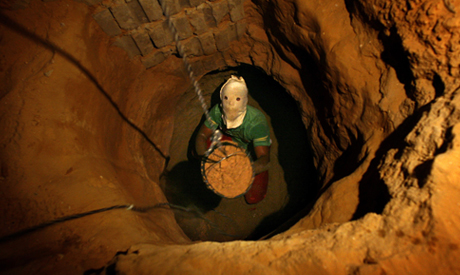Hamas, choked by blockade, seeks to avoid Egypt clash
Gaza ruling group Hamas shies away from clash with Egypt's interim authorities, leaders say Palestinian enclave poses no security threat to its southern neighbour
AFP, Tuesday 24 Sep 2013

A
Palestinian tunnel digger, wearing a mask to conceal his identity,
removes sand in a bucket from a tunnel underground in Rafah, in the
southern Gaza Strip, on the border with Egypt. Wednesday, 1 Aug, 2007
(Photo: AP)
In July, Egyptian president Mohamed Morsi, a member of the Muslim Brotherhood, a close Hamas ally, was ousted.
During Morsi's year in power, Cairo had eased up on movement between Egyptian territory and Gaza, which had been more tightly controlled under ex-president Hosni Mubarak and the military regime that temporarily took power after he was toppled.
But after the July overthrow, the new interim authorities started turning the screws again.
They have repeatedly closed the Rafah border crossing and destroyed hundreds of tunnels running under the town that Hamas used for years to import fuel, building materials and other goods.
Hamas strongly condemned the Egyptian army after it subsequently drove the Brotherhood underground in a sweeping crackdown, saying it had committed "terrible massacres."
But Hamas has since sought to downplay any tensions.
Adnan Abu Amr of Umma University in Gaza, said: "Hamas faces a crisis and strangulation that is forcing it to step back and minimise the chances of a clash with Egypt. (They hope) this will stop any unexpected Egyptian moves," he said.
The situation "requires that Hamas appear flexible. Standing up to the Egyptian army is not in their interest."
And Hamas officials have made clear that this is their policy.
Spokesman Fawzi Barhum insisted in remarks to AFP that "Gaza does not pose a threat to Egypt's security and will not do so," urging Egypt to "open Rafah permanently."
Egypt says it has closed the Rafah crossing for "security reasons" as it seeks to cleanse the Sinai Peninsula, which borders Gaza, of Islamist militants.
Earlier this month, Gaza's Hamas prime minister Ismail Haniya condemned "attempts to draw the resistance (Hamas) into sideline battles away from the (real) enemy (Israel)."
"The government is not steering the people towards fighting Egypt or towards aggression against any state, regardless of the unprecedented pressure and circumstances the Palestinian people are under," he said.
Political analyst Akram Ataallah said Hamas was "sending a message of detente to the Egyptian army and government -- that it does not want a clash, and that the army is the sole authority that geographically controls Hamas's life."
In the latest show of force from Egypt, a military court sentenced five Palestinian fishermen to a year each in jail last Wednesday for illegally entering the country's territorial waters.
Hamas is also suffering because Egypt controls who goes in and out through Rafah, Ataallah said.
Under Morsi, Cairo welcomed Hamas's leaders -- many of whom are based in exile, including its Qatar-based head Khaled Meshaal -- to discuss security and economic cooperation with senior officials.
Mussa Abu Marzuq, head of Hamas's political office, asked on his public Facebook page this week: "Is there any sensible person who believes that the people of Gaza would label Egypt the enemy when it's the only one (controlling) their living standards and contact with the outside world?"
Gaza has struggled financially since Egypt destroyed the Rafah tunnels, with a fuel shortage that threatens to shut down its sole power station, the Hamas energy authority says.
And the government has announced that it would have to underpay its 40,000 employees for the third month in a row.
Haniya reiterated that there was no reason for a "struggle against Egypt, whether it's the government, army or its people and parties, and we shan't interfere in the internal affairs of any country."
His comments came after accusations in the Egyptian press that Hamas was aiding the Brotherhood militarily, with the aim of attacking Egypt's army.
Abu Marzuq, who is based in Egypt, appeared on an Egyptian television programme apologising for the reaction of its military wing to the Brotherhood crackdown.
Military vehicles of the Ezzedine al-Qassam Brigades, carrying masked militiamen, had paraded in Gaza's streets in what was considered a threat to Egypt's army.
This story has been edited by Ahram Online
Labels: Conflict, Egypt, Gaza, Hamas, Muslim Brotherhood

<< Home